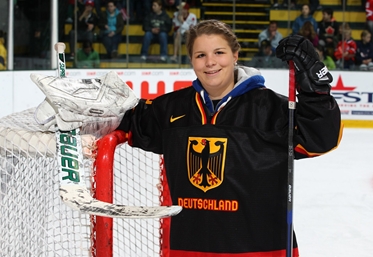Zorn makes history
Zorn makes history
Germany’s best young goalie became team’s top scorer

 Julia Zorn, Germany's top forward at the 2012 IIHF Ice Hockey Women's World Championship, began her hockey career between the pipes. Photo: Andre Ringuette / HHOF-IIHF Images
Julia Zorn, Germany's top forward at the 2012 IIHF Ice Hockey Women's World Championship, began her hockey career between the pipes. Photo: Andre Ringuette / HHOF-IIHF Images
Incredibly, Zorn was the starting goalie for Germany at the first U18 event for women, in Calgary in 2008. A year later, she tossed aside the pads and became a skater. At the 2012 IIHF Ice Hockey Women’s World Championship in Burlington, Vermont, Zorn led her team in scoring with four goals in five games.
In fact, she scored four of the team’s eleven total goals. Overall, only five other players in the entire tournament scored more goals than Zorn.
Back in 2008, Zorn played all but 25 minutes in goal for the Germans, compiling a 3-2 record and an excellent 2.61 goals-against average on a team that finished fifth.
“I started skating at age six in New Munich,” Zorn started, “and the friend I grew up with played hockey. I have three older brothers who don’t play. But I also wanted to play soccer. My mom said, okay, play hockey. She thought I would quit after one season!”
Zorn didn’t quit. Instead, she fell in love with the sport. But an unexpected gift changed her ambitions from shooter to stopper.
“At first, I had to learn how to skate,” she explained. “I started being a goalie at age seven. My coach gave me a goalie stick as a present, so after that I wanted to play goal. I used player skates for the first three years. I didn’t get goalie skates until I was ten.”
Of course, kids’ hockey is all about learning the basics. Zorn kept with it and then decided to make it the focus of all her free time.
“When I started to go to high school, where I didn’t have so much time, I had to decide whether I was going to be serious about hockey or not. I decided I wanted to be, and my parents were very supportive. They drove me everywhere. By the time I was 12, I knew I really wanted to play and keep going with it.”
Continue readingIn the hockey world, Germany’s women’s hockey program is small, so it wasn’t long before the talented Zorn appeared on the radar of the national team.
“When I was 13, I started to play with female players,” she explained. “I had always been a goalie at this point. My coach from the national team – because we don’t have that many players in Germany, he knows everybody – invited me to a camp, and that’s how I started with the national program.”
Zorn made the U18 team at age 17 and was the starting goalie throughout the 2008 tournament. “I started every game, and I also started against Canada,” she said with pride, “but I allowed seven goals and the coached pulled me for a few minutes. But I went back in.”
That game was a 10-1 win for Canada, and if her stats from that game are discarded, Zorn allowed just five goals in the other four complete games she played.
So what happened between 2008 and 2012? Why would a promising young goalie with talent and opportunity abandon the crease?
“When we had those fun practices,” she explained, “I always wanted to be a skater. I stickhandled a lot in my free time because it’s fun. My friends and I would play street hockey, and I was always a shooter, not a goalie. Then I had a foot injury and I couldn’t play goal because the movement was difficult. So my coach suggested that I just start to skate first to get into shape and get back on the ice because he knew I could skate. It was so much fun for me, so I decided to be a skater. This was 2008-09.”
And so the transformation began. Germany played in Division I of the 2009 Women’s Worlds, and Zorn played all five games, recording one assist. The next year was an Olympic year, but in 2011, again in Division I, Zorn had a goal and an assist, helping the team win the group and earn promotion to this year’s top pool.
The transformation was complete, but it was a process, to be sure.
“I had to learn a lot of things,” Zorn explained. “For example, skating is totally different. I had to be aware of what you do in the offensive zone, in the defensive zone. I had to learn all of these things, but my coach made it easy for me. He helped me a lot.”
In Burlington, Zorn was a key player on the German team. She scored the game-winning goal in the team’s first game, a 3-2 victory over Switzerland. In the first relegation game against Slovakia it was Zorn’s goal in the second period which tied the game and eventually led to a shootout. In the second game of the relegation, she opened the scoring with an early goal short-handed to send the team on its way to a 3-1 win and earn the trip to Ottawa 2013.
Now that’s she’s moved out of the crease, she has no desire to move back.
“I would always choose being a skater,” she admitted. “It’s more fun, maybe because of the way it is in the German league for women. When I was a goalie, my team was strong, so sometimes we would win games 16-0, and I was just standing in goal for an hour doing nothing.”
But if Germany were ever pressed to find a goalie on short notice, the team only has to look to its leading scorer. Zorn is that talented.
Back to Overview
















































